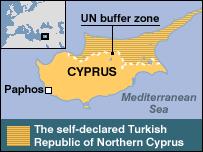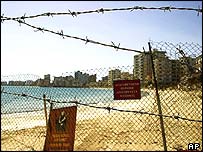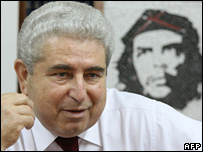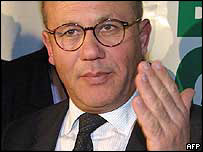 |
By legend the birthplace of the ancient Greek goddess of love Aphrodite Cyprus's modern history has in contrast been dominated by enmity between its Greek and Turkish inhabitants.
Cyprus has been divided since 1974 when Turkey invaded the north in response to a military coup on the island which was backed by the Athens government.
Overview
In 1974 the island was effectively partitioned with the northern third inhabited by Turkish Cypriots and the southern two-thirds by Greek Cypriots.
A "Green Line" - dividing the two parts from Morphou through Nicosia to Famagusta - is patrolled by United Nations troops.
The UN drew up the Green Line as a ceasefire demarcation line in 1963 after intervening to end communal tension. It became impassable after the Turkish invasion of 1974 except for designated crossing points.

The island's partition has been in place since 1974
|
In 1983 the Turkish-held area declared itself the Turkish Republic of Northern Cyprus. The status of Northern Cyprus as a separate entity is recognised only by Turkey which keeps around 30000 troops in the north of the island.
The prospect of EU enlargement concentrated minds in the search for a settlement. UN-sponsored negotiations continued throughout 2002 and a peace plan was tabled. Soon afterwards the EU invited Cyprus to become a member.
But hopes that the island could join united were dashed when leaders of the Turkish and Greek communities failed to agree to the UN plan by the March 2003 deadline.
In the months that followed travel restrictions were eased enabling people to cross the border for the first time in nearly 30 years raising hopes that progress might be on the way.
As EU entry approached a revised UN reunification plan was put to both communities in twin referendums in April 2004.
The plan was endorsed by Turkish Cypriots - though not by their then leader Rauf Denktash - but overwhelmingly rejected by Greek Cypriots. Because both sides had to approve the proposals the island remained divided as it joined the EU in May. EU laws and benefits apply only to the Greek Cypriot community.
More than two years later hopes of progress were rekindled at UN-sponsored talks between Cypriot President Tassos Papadopolous and Turkish Cypriot leader Mehmet Ali Talat. The two agreed on a series of confidence-building measures and contacts between the communities.
Hopes were given further impetus by the election of Demetris Christophas as president in February 2008. He immediately began talks with Mehmet Ali Talat on reuniting the country as a bizonal federal state.
However the initial optimism faded as talks made only slow progress through 2008 and hopes for a deal were dealt a blow by the victory of right-wing nationalists at parliamentary elections in northern Cyprus in April 2009.
Turkey has a particular interest in seeing the situation resolved as its own EU aspirations are linked to the island's future.
Facts
- Full name: Republic of Cyprus
- Population: 871000 (combined) (UN 2009)
- Capital: Nicosia (Lefkosia to Greek Cypriots Lefkosa to Turkish Cypriots
- Area (combined): 9251 sq km (3572 sq miles)
- Major languages: Greek Turkish
- Major religions: Christianity Islam
- Life expectancy: 77 years (men) 82 years (women) (UN)
- Monetary unit: Euro from 1 January 2008; Turkish lira used in north
- Main exports: Clothing potatoes cigarettes pharmaceuticals
- GNI per capita: US $22950 (World Bank 2008)
- Internet domain: .cy
- International dialling code: +357
Leaders
Cypriot president: Demetris Christofias
Communist Party leader Demetris Christofias won the presidential election of February 2008 by a big margin.

President Demetris Christofias
|
Ending the 34-year-old division of the island was the main campaign theme of Mr Christofias a builder's son from a village now in Turkish-held Northern Cyprus.
His election gave new impetus to talks aimed at reunifying the island as part of the EU but hoped-for early progress turned out to be elusive.
Mr Christofias was educated in the Soviet Union and is a fluent Russian-speaker. He joined the communist-rooted AKEL party at the age of 14 and rose through its ranks to become leader in 1988. He has a penchant for wearing Che Guevara T-shirts.
Mr Christofias was elected president of the Cypriot House of Representatives in 2001 and won re-election in 2006.
Turkish Cypriot leader: Mehmet Ali Talat

Mehmet Ali Talat favours reunification
|
Mehmet Ali Talat of the centre-left Republican Turkish Party won a convincing victory in presidential elections in the self-declared Turkish Republic of Northern Cyprus in April 2005.
Unlike his veteran predecessor Rauf Denktash who retired after leading the Turkish Cypriot community for three decades he would like to see reunification and membership of the EU for the whole island.
He campaigned strongly in favour of the UN reunification plan which was put to a referendum in 2004 when the Turkish Cypriot community gave it firm backing.
In 2008 he began talks on reunification with the new left-wing Greek Cypriot leader Demetris Christofias.
However frustration over the slow progress helped the nationalist National Unity Party which favours unification with Turkey win parliamentary elections in April 2009 effectively tying Mr Talat's hands in the negotiations.
Mr Talat was born in 1952. He has a degree in electrical engineering from Ankara University and speaks fluent English.
Media
The Cypriot media mirror the island's political division with the Turkish-controlled zone in the north operating its own press and broadcasters.
State-run radio and TV compete with private operators and relays of Greek and Turkish stations are on air across the island. Nicosia officials say the switch from analogue to digital TV broadcasting will be made in 2011.
Obstacles to the free flow of news across across the divide weigh heavily on journalists Reporters Without Borders said in its last account of media freedom on the island (2006).
There were around 325000 internet users by March 2008 (Internetworldstats).
The press
- Cyprus Mail - English-language daily
- The Cyprus Weekly - English-language
- Politis - Greek-language daily
- Simerini - Greek-language daily
- Kibris Gazete (northern Cyprus) - Turkish-language
Television
- Cyprus Broadcasting Corporation (CyBC) - public operates RIK 1 RIK 2
- Bayrak Radio-TV (northern Cyprus) - operates BRT 1 BRT 2
- Sigma - private
Radio
- Cyprus Broadcasting Corporation (CyBC) - public operates Radio 1 (in Greek) Radio 2 (in English Turkish Armenian) Radio 3 (in Greek) and Love Radio
- Radio Proto - private FM network
- Astra 92.8 - private FM network
- Bayrak Radio-TV (northern Cyprus) - operates Bayrak Radio 1 (in Turkish) Bayrak International (in English) Bayrak FM and Bayrak Klasik
News agencies
- Cyprus News Agency - "semi-governmental" news agency
-
TAK (northern Cyprus)
AFRICA | ASIA-PACIFIC | AMERICAS | EUROPE | MIDDLEEAST | SOUTHASIA
Mauritania Mauritius Morocco Mozambique Namibia Niger Nigeria Republic-of-congo Rwanda Sao-tome-and-principe Senegal Seychelles Sierra-leone Somalia South-africa Sudan Swaziland Tanzania The-gambia Togo Tunisia Uganda zambia Zimbabwe Australia Brunei Burma Cambodia China East-timor Fiji Indonesia Japan Kazakhstan Kiribati Kyrgyzstan Laos Malaysia Marshall-islands Micronesia Mongolia Nauru New-zealand North-korea Palau Papua-new-guinea Samoa Singapore Solomon-islands South-korea Taiwan Tajikistan Thailand The-philippines Tonga Turkmenistan Tuvalu Uzbekistan Vanuatu Vietnam Antigua-and-barbuda Argentina Bahamas Barbados Belize Bolivia Brazil Canada Chile Colombia Costa-rica Cuba Dominica Dominican-republic Ecuador El-salvador Grenada Guatemala GuyanaHaiti Honduras Jamaica Mexico Nicaragua Panama Paraguay Peru St-kitts-and-nevis St-lucia St-vincent-and-the-grenadines Suriname Trinidad-and-tobago United-states-of-america Uruguay Venezuela Albania Andorra Armenia Austria Azerbaijan Belarus Belgium Bosnia-hercegovina Bulgaria Croatia Cyprus Czech-republic Denmark Estonia Finland France Georgia Germany Greece Hungary Iceland Ireland Italy Latvia Liechtenstein Lithuania Luxembourg Macedonia Malta Moldova Monaco Montenegro Norway Poland Portugal Russia San-marino Serbia Slovakia Slovenia Spain Sweden Switzerland The-netherlands Turkey Ukraine United-kingdom Vatican Algeria Egypt Iran Iraq Israel-and-palestinian-territories Jordan Kuwait Lebanon Libya Mauritania Oman Saudi-arabia Sudan Syria Tunisia United-arab-emirates Yemen Afghanistan Bangladesh Bhutan India Nepal Pakistan Sri-Lanka The-Maldives

